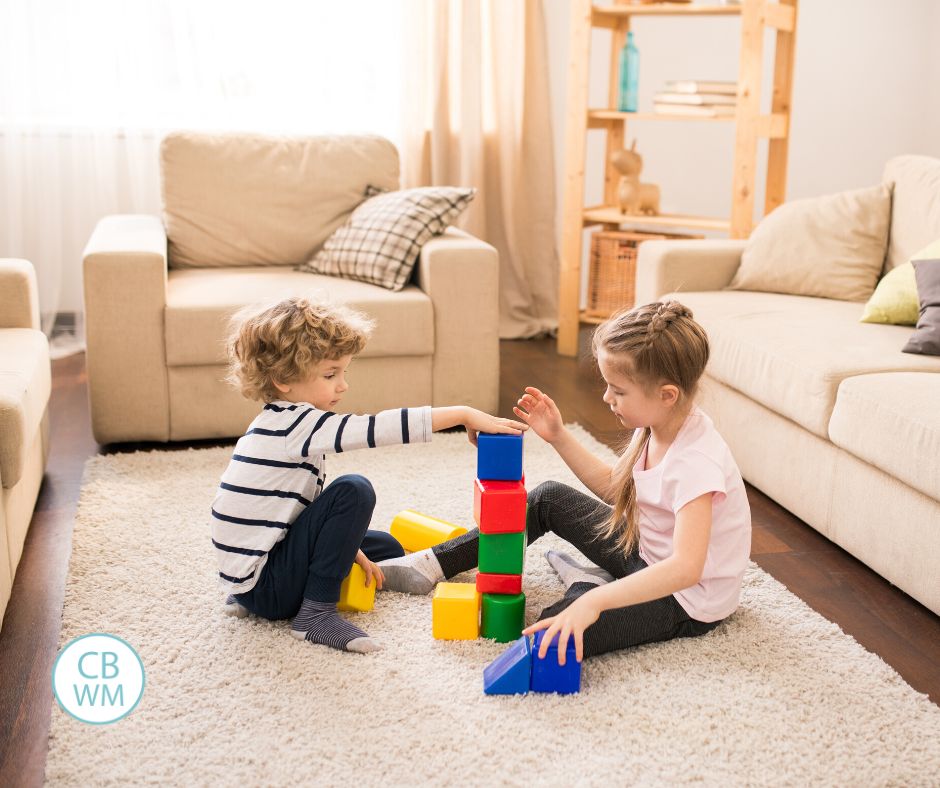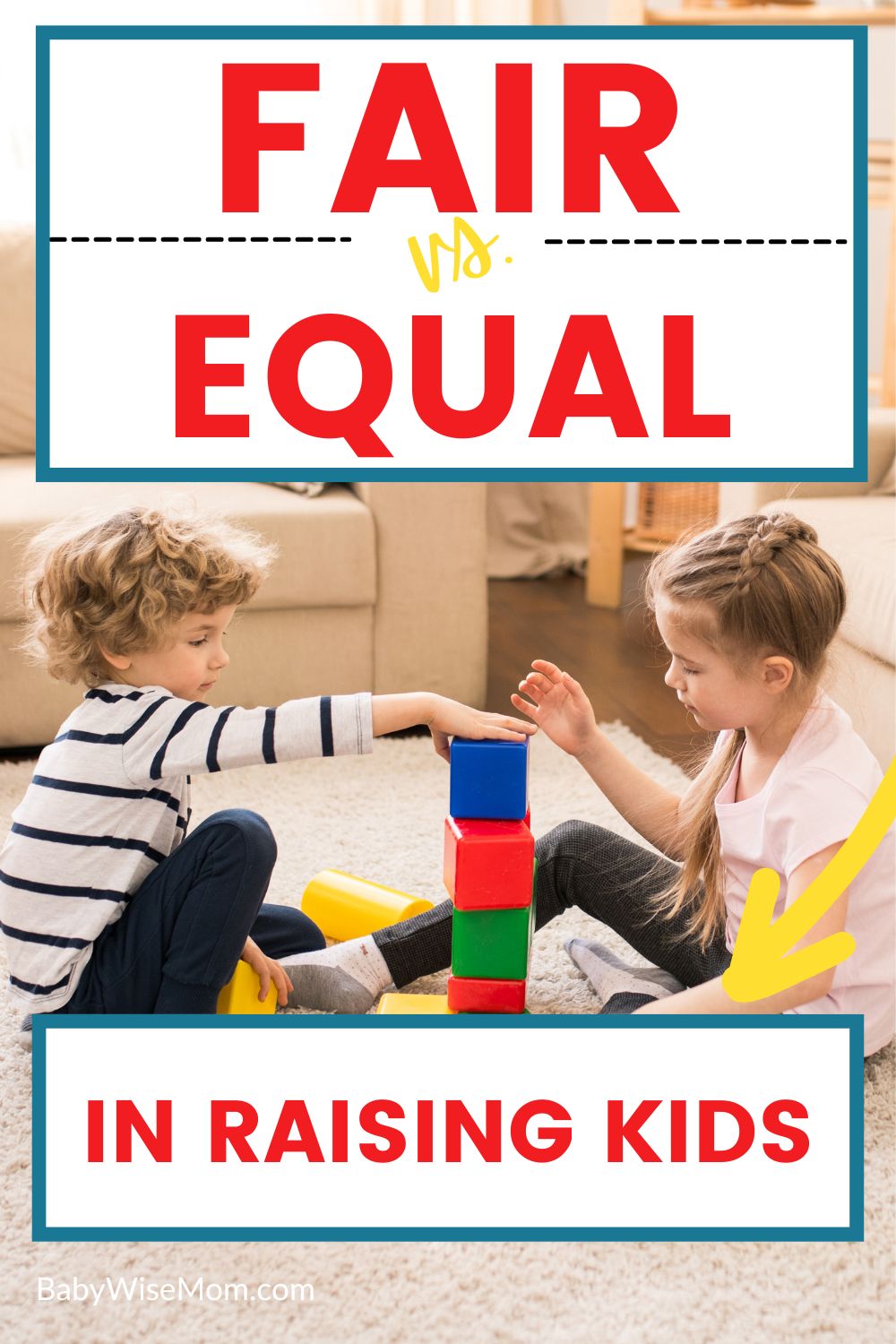Should you try to keep things equal among your children? Or should you parent them individually? How do you keep siblings in the funnel and on track with age-appropriate responsibilities and privileges?

Many years ago, when Brayden was still very young, I had a conversation with a dear friend of mine that stuck with me and had a strong impact on my parenting.
It was simple, really.
She was talking about her siblings (she has a lot) and them wanting everything to be “fair.” She said, “Life isn’t even-steven.”
Maybe it was the rhyme or the fact that I hadn’t thought deeply about the idea of “even-steven” before, or just my new job as a mom and my way of analyzing pretty much everything, but I really thought about that a whole lot.
Since that conversation, I have analyzed the idea of “fair” as it is commonly used and the idea of equal.
Post Contents
Life is Not Fair
We often hear the phrase, “Life isn’t fair.”
It is true–life often is not fair. Unfair things happen to all people.
And perhaps to compensate for the unfairness life can offer, or the desire to avoid conflict within our home, many of us find ourselves doing everything we can to make life “fair” for our children within our home.
But it isn’t fair. And trying to make things “fair” for our kids really isn’ fair to them.
What we are doing is not fair.
Fair vs. Equal
What we are doing is trying to make life equal. Which, in reality, isn’t fair.
According to my Oxford Dictionary (on a side note, don’t talk to me about Webster–I am all about Oxford), “fair” means
“in accordance with the rules or standards; legitimate…just or appropriate in the circumstances.”
“Equal” means
“being the same in quantity, size, degree, or value.”
To make life equal for our children, we might get them the same Christmas presents so they don’t fight over a toy or get jealous of each other.
We might give them all the same bedtime.
We might let a 2 year old stop napping since the 4 year old isn’t napping anymore.
We might allow younger children to watch shows that are above their maturity level, or prevent older children from watching shows at their level because it isn’t appropriate for the younger children.
There are many ways we take life and try to make it all equal for our children.
But that isn’t fair.
Making Things Equal Actually Isn’t Fair to Kids
It isn’t fair to either child to make bedtime at the same time for everyone if one child needs an earlier or later bedtime than another.
It isn’t fair to deny a privilege to an older child because the younger child would complain, or to give a younger child a privilege she is not ready to take on.
It might be equal, but it is not fair.
It isn’t fair to put a young child in a position they aren’t ready to handle yet. Letting a 2 year old not take a nap isn’t fair to them. They will be overly tired and becoming difficult. They then get looked at as difficult kids when really they are just tired kids.
Keeping Children in the Funnel
The idea of fair vs. equal is really in sync with the concept of keeping children in the funnel.
When you keep your kids in the funnel, they have responsibilities and privileges that are appropriate for their age.
This sets your kids up for success. It avoids so many issues that can come from being wise in your own eyes (because you have more freedom than you can handle) or being frustrated (because you don’t have enough freedom).
This is hard to do and even harder to get right when balancing siblings. Read my tips on this in How to Keep Siblings in the Funnel
Finding Compromise in Families
Now, of course, life is not lived in a vacuum. Compromise is required when you live with a family.
Sometimes, in order to protect our younger child from seeing a show that is too mature for her, we have to tell our older child she can’t watch that show right now. Maybe they can watch it during the younger sibling’s naptime or maybe they can stay up a little later one Friday night to watch it.
Sometimes our younger children are exposed to things at an earlier age than ideal just because she has older siblings. A fourth child just gets exposed to more things at a younger age than first child.
I like the part of the definition of fair that says, “just or appropriate in the circumstances.”
Circumstances change and are unique at all times. We have to be able to judge according to circumstances what is appropriate.
Let me give you an example. When Kaitlyn was 5 and McKenna was 3, we read the first Harry Potter book with Kaitlyn. We told her that once she had finished the book, she could watch the first movie.
The trick was to find a time when she could watch it. We did not think it is appropriate for McKenna to see the movie yet, so it had to be watched without McKenna.
One day, McKenna was taking a nap and Kaitlyn was able to watch the movie during the nap. The movie, however, is quite long, and McKenna was awake before the movie was over.
Rather than making Kaitlyn turn the movie off or letting McKenna watch the movie, I took McKenna to another room and had her stay with me while Kaitlyn finished the movie.
I told McKenna she was not old enough to watch the movie yet, and she didn’t complain about it at all. Why? Because I worked to keep things fair, but not equal among the kids.
That worked for our circumstances. Our home is set up in a way that it was possible to do so. Some people might live in a set-up that would require the movie to be turned off for now once the younger child is awake.
You have to judge according to your own circumstance.
Demanding things to be “equal” and striving for it is not unique to children–adults demand equality, too, even when equality is completely unfair. It is so potent in our society, so it is no wonder that it creeps into our families.
People who believe in fairness rather than just equality are people who are willing to put in the time and effort required to attain certain things in life.
Sure, life isn’t always fair. Sometimes bad things happen to good people. It is impossible for me to consider this topic without including my religious beliefs (or any topic really), and I believe in the end justice and mercy will be completely satisfied (think of the Sermon on the Mount found in Matthew 5…”Blessed are the meek: for they shall inherit the Earth.”).
It is an easy trap to fall into–trying to make all things equal among our children.
It is not easy to listen to kids whine. We are tired. We are exhausted. We want peace.
Parenting is hard.
As you navigate parenting, I would encourage you to take a step back and really consider “fair” vs. “equal.” Your children will complain with “That’s not fair!”
I have shared before, but when my children complain about things not being fair (and they do), I tell them it is fair, but if they want equality we can make sure that happens.
I then list the things they will get to do so things are equal (like, when Brayden was younger, I told Brayden could take a two hour nap each day if he wanted to be equal with McKenna).
One December when Brayden was 7, Brayden complained because my mom bought a stuffed animal for Kaitlyn and a stuffed animal for McKenna that day. Despite the fact that Brayden was not interested in stuffed animals, he complained about it.
It didn’t seem fair.
My husband reminded him of all of the many times Brayden had gone golfing with my dad and the girls hadn’t gone. We explained that it took money to do that, and if he would like things to be equal, we could have him stop golfing until his sisters had caught up dollar for dollar.
He decided it wasn’t so “unfair” after all.
Sometimes kids just need some perspective to realize life is just fine.
Conclusion
I really hope my children can grow to be happy for other people. I want them to be able to cheer for others when they have good things happen for them.
I want my children to be content enough with their own lives that instead of crying out “unfair!” they can be happy for others and happy for themselves.
To attain that, it will take more than simply outlining the denotation of the words “fair” and “equal.” A whole lot more. But I think it is a small first step.
Related Posts
- How to Respond to Siblings Fighting
- When One Child is Harder Than the Other(s)
- Helping Siblings Like Each Other
- Consistently Parenting Your Different Children
- How to Set Boundaries for Children & Siblings

This post first appeared on this blog in December 2012
